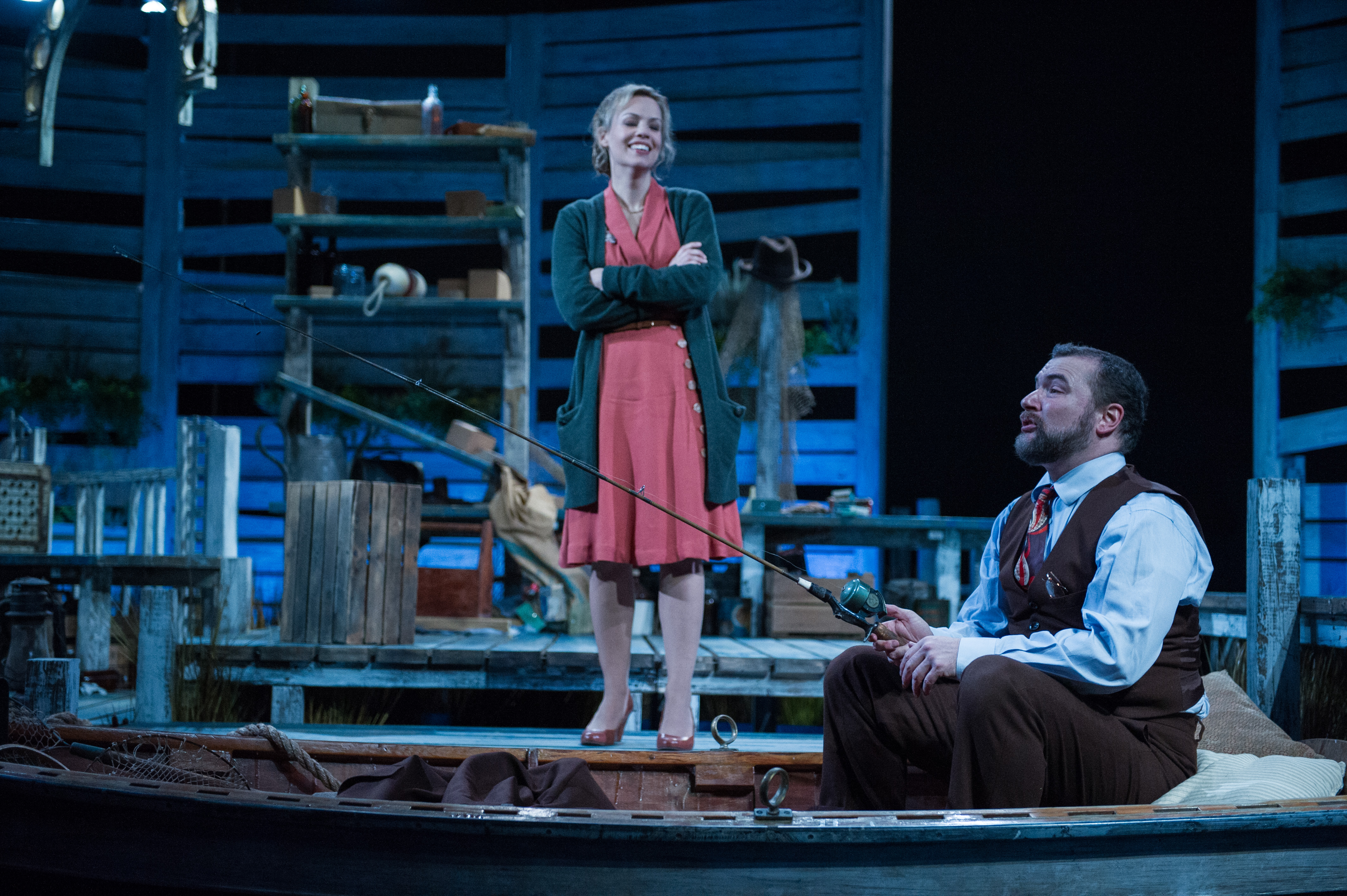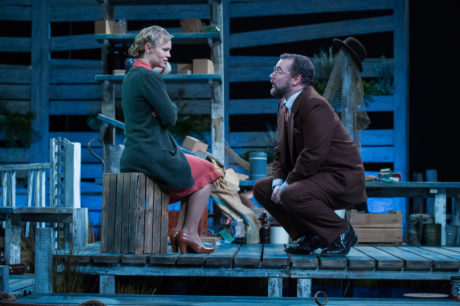As Talley’s Folly opens, 40-something-year-old, self-described “hairy Jewish accountant” Matt Friedman (John Taylor Phillips) steps onto the stage and informs the audience that he has 97 minutes to tell the story. He notes that attendees are seated where the river that winds past the Talley place in Lebanon, Missouri (playwright Lanford Wilson’s hometown) would be.
The loquacious Matt describes the sounds and the lighting of the abandoned, dilapidated boathouse, and makes it clear that while he is not the romantic sort, it is romance that brings him to this place by the river. It is early evening in 1944 on the Fourth of July and Matt has driven from Saint Louis to propose to Sally Talley (Erin Weaver), a nurse’s assistant and daughter of one of the county’s richest families.

Matt’s arrival at the front door of the Talley place has already not gone well. They are a conservative Methodist family whose roots in Lebanon go back generations. He is a talkative foreign Jew from the city, or more accurately, many cities—his is a refugee story he is reluctant to tell. Despite the New Deal and the war effort saving the Talleys’ garment factory from the ravages of the Great Depression, Sally’s relatives hate FDR, and Matt seems to be exactly what they see when they imagine a communist infiltrator. In the moments before Matt flees to the boathouse, Sally’s brother has already threatened him with a shotgun. Sally returns home from the hospital only minutes after the commotion.
This meta-fictional framing is a clever ploy by Wilson in this otherwise naturalistic two-hander about lovers evasive in love—and perhaps a sly warning that realism is just another type of artifice. The couple had a week-long romance the previous summer, but since his return to Saint Louis, Matt’s many letters had gone unanswered. Most long-distance lovers would be deterred, yet many in Sally’s orbit have encouraged her to not give up hope that she might also love him.
Both Sally and Matt have their secrets, and each their own strategies of keeping them. Sally Talley might at first glance be an archetype of the 31-year-old spinster with a tragic past, but she knows she is more than that: she is also a rebel who was fired from her post as a Sunday school teacher after introducing readings from Catholics like Augustine of Hippo and sociologists like Thorstein Veblen at a time when her students’ parents were striking against the very factory in which her family had a financial stake.
Meanwhile, Matt uses his bookishness and polyglotism to both entertain and distract from the heart of the manner. A facility for language has allowed him to hide his accent and his personal history, but it often manifests as much as a predilection to switch dialects at inappropriate moments as it does for doing impressions of Groucho Marx and Humphrey Bogart (this production could not have been possible without Dialect/Vocal Coach Nancy Krebs).
However much Matt and Sally have been constrained by their times and places, they have developed intellects that lead to both a mutual fascination for and frustration with one another. They each pose a mystery and a demand to reveal their secrets.
Phillips and Weaver handle these demanding roles and the dynamic onstage relationship with both deftness and depth. As Matt, Phillips has the more eccentric role as the rootless cosmopolitan who, upon realizing he has fallen in love for the first time, has thrown most caution to the wind; he knows his heart even as his self seems to be a processional masquerade of different nationalities and movie stars.
Weaver’s role may be less flamboyant but has a no less demanding role as Sally. Sally has seen too much of life to be an ingenue: there is her personal tragedy, but also her work in a hospital for wounded and maimed soldiers—this weariness is always evident in Weaver’s portrayal. But Weaver also intuits exactly when Sally must go from exasperation to admiration for this strange man who is awkwardly proclaiming his love for her. Phillips and Weaver have many fine moments together, such the physical comedy of miming ice skating on a July evening.
Director Aaron Posner and his cast have captured the musicality of Wilson’s language while also mapping out every reversal and unfolding of the characters’ emotions. At the same time, Posner’s production team has created designs that help unpack Wilson’s themes.

Scenic Designer Paige Hathaway’s set design portrays the gorgeous decay of the rundown boathouse, with its quay, docks, and ornamental gazebo (the literal “folly” of the title) looking as if it is only held together by gravity and the same vines, reeds, and grasses that will ultimately pull it apart. Efforts to build something permanent on the bank of a flowing river teeming with life is folly as well. Meanwhile, Kasey Hendricks, as Prop Designer, has populated the boathouse with several decades of discarded and hidden items like secrets ready to be discovered. It is as if the stage is the world in miniature.
Lighting Designer Jesse Belsky creates a slow moonrise (alluded to in Matt’s opening monologue) over the course of the 97 minutes of stage time in which one’s attention is so focused on the two lovers that the glow of the full moon is almost a surprise.
Theater J’s staging of Wilson’s Pulitzer Prize-winning Talley’s Folly is part of its season of wandering as its space at the DC Jewish Community Center is being renovated. This time the company finds itself guests at GALA Hispanic Theatre’s home in the landmark Tivoli Theatre on an otherwise gentrified block of Columbia Heights. This masterful production is a welcome reminder of a classic work of American naturalistic drama.
Running Time: 97 minutes, with no intermission.
Talley’s Folly plays through December 30, 2018, at Theater J at GALA Hispanic Theatre – 3333 14th Street NW in Washington, DC. For tickets, call the box office at (202) 777-3210 or purchase them online.




